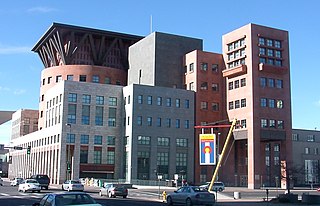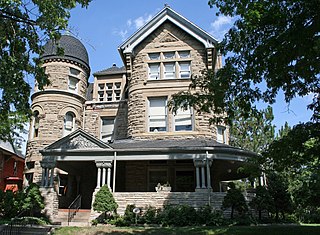
Leadville is a statutory city that is the county seat, the most populous community, and the only incorporated municipality in Lake County, Colorado, United States. The city population was 2,633 at the 2020 census. It is situated at an elevation of 10,158 feet (3,096 m). Leadville is the third highest incorporated city in the United States behind Alma and Montezuma and is surrounded by two of the tallest peaks in the state.

Margaret Brown, posthumously known as the "Unsinkable Molly Brown", was an American socialite and philanthropist. She was a survivor of the RMS Titanic, which sank in 1912, and she unsuccessfully urged the crew in Lifeboat No. 6 to return to the debris field to look for survivors.

The Molly Brown House Museum is a house in Denver, Colorado, United States that was the home of American philanthropist, activist, and socialite Margaret Brown. She survived the sinking of the RMS Titanic and was known as the “Heroine of the Titanic” for her service to survivors. She later became known as "The Unsinkable Molly Brown". The museum is her former home and presents exhibits interpreting her life, Victorian Denver and historic preservation. The house was listed on the National Register of Historic Places in 1972. It is designated as a Denver Landmark.

The Brown Palace Hotel, now The Brown Palace Hotel and Spa, Autograph Collection, is a historic hotel in Denver, Colorado, United States. It is listed on the National Register of Historic Places and is the second-longest operating hotel in Denver. It is one of the first atrium-style hotels ever built. It is now operated by HEI Hotels and Resorts, and joined Marriott's Autograph Collection Hotels in 2012. The hotel is located at 321 17th Street between 17th Street, Broadway and Tremont Place in downtown Denver behind the Republic Plaza. The main entrance door is on Tremont Place.

The Colorado State Capitol Building, located at 200 East Colfax Avenue in Denver, Colorado, United States, is the home of the Colorado General Assembly and the offices of the Governor of Colorado, Lieutenant Governor of Colorado, and the Colorado State Treasurer.

The Denver Public Library is the public library system of the City and County of Denver, Colorado. The system includes the Denver Central Library, located in the Golden Triangle district of Downtown Denver, as well as 25 branch locations and two bookmobiles. The library's collection totals more than 2 million items, including books, reference materials, movies, music, and photographs. Of that total, more than 347,000 items are in specific collections including the Western History and Genealogy Department, Blair-Caldwell African American Research Library, and Reference Department holdings.

The Central City Opera House is located in the Central City/Black Hawk Historic District in Central City, Colorado, United States. It was constructed in 1878. It has offered operatic and theatrical productions that drew prominent actors and performers in the late 19th-century, and in the early 20th-century it was a motion picture theater.

James Joseph "J.J." Brown, was an American mining engineer, inventor, and self-made member of fashionable society. His wife was RMS Titanic survivor Margaret Brown.

Jules Jacques Benois Benedict was one of the most prominent architects in Colorado history, whose works include a number of well-known landmarks and buildings listed on the National Register of Historic Places.

St. Elmo is a ghost town in Chaffee County, Colorado, United States. Founded in 1880, St. Elmo lies in the heart of the Sawatch Range, 20 miles (32 km) southwest of Buena Vista and sits at an elevation of 9,961 feet (3,036 m). Nearly 2,000 people settled in this town when mining for gold and silver started. The mining industry started to decline in the early 1920s, and in 1922 the railroad discontinued service. The community is listed on the National Register of Historic Places as the St. Elmo Historic District. It is one of Colorado's best preserved ghost towns.
Edward Divine White Jr., FAIA, was an architect based in Denver, Colorado, whose forty-year practice focused on contemporary architecture and historic preservation. Along with his architectural practice, White was lifelong friend to Jack Kerouac from 1947 to Kerouac's death in 1969. The pair exchanged over 90 letters and postcards during that time.

The Pioneer Sod House in Wheat Ridge, Colorado is a sod house built in 1886 or perhaps well before. It was listed on the National Register of Historic Places in 1973.

William A. Lang (1846–1897) was an architect active in Denver, Colorado from 1885 to 1893. On his own or in partnership he designed a number of buildings that survive and are listed on the U.S. National Register of Historic Places. Lang partnered with Marshall Pugh to form Lang & Pugh in 1889. The firm also employed Reinhard Schuetze for a time.

Frank E. Edbrooke, also known as F.E. Edbrooke, was a 19th and early 20th century architect in Denver, Colorado who has been termed the "dean" of Denver architecture. Several of his surviving works are listed on the National Register of Historic Places including Brinker Collegiate Institute, built in 1880 and NRHP-listed in 1977.

William Ellsworth Fisher was an architect who founded the Denver, Colorado firm that became Fisher & Fisher.
Maurice B. Biscoe was an American architect. He worked in New York and then moved to Denver, Colorado. He returned to the east to work in Boston. His work was part of the architecture event in the art competition at the 1932 Summer Olympics. A number of his works are listed on the U.S. National Register of Historic Places.

George Hebard Williamson was an American architect.
Frederick Albert Hale was an American architect who practiced in states including Colorado, Utah, and Wyoming. According to a 1977 NRHP nomination for the Keith-O'Brien Building in Salt Lake City, "Hale worked mostly in the classical styles and seemed equally adept at Beaux-Arts Classicism, Neo-Classical Revival or Georgian Revival." He also employed Shingle and Queen Anne styles for several residential structures. A number of his works are listed on the U.S. National Register of Historic Places.

The Emmanuel Gallery is an art gallery and historic building at 1205 10th Street in Denver, Colorado, United States, on the Auraria Campus.

The Ghost Building in Denver, Colorado, United States is literally a ghost of its former self. Originally built at 15th and Glenarm Streets in 1889 for real estate developer Allen M. Ghost by architect William A. Lang, better known for designing the Molly Brown House. When this building, listed in the National Register of Historic Places #78000847, was threatened with demolition in the 1970s, a Denver architect Brian T. Congleton proposed disassembling the facade and reassembling it elsewhere. After nearly a decade in storage, Brown-Schrepferman reassembled this historic building on the corner of 18th and Stout in downtown Denver in 1984. The building was reconstructed using the original details and stone facade, around a modern steel structure. The current manifestation of the building is not listed in the National Register of Historic Places.


















